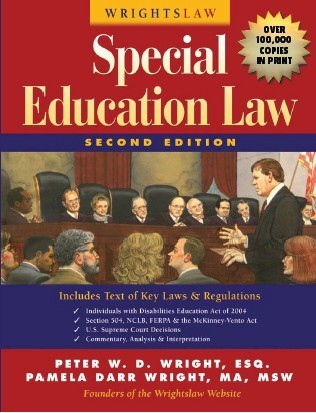IDEA 2004 – it’s the law.
What does the la w say about Individualized Educational Programs (IEPs) and IEP teams? Transition plans? What does the law say about reviewing and revising IEPs? Multi-year IEPs? Who may be excused from IEP meetings and under what circumstances?
w say about Individualized Educational Programs (IEPs) and IEP teams? Transition plans? What does the law say about reviewing and revising IEPs? Multi-year IEPs? Who may be excused from IEP meetings and under what circumstances?
What does the law say about evaluations, reevaluations and parental consent?
What does the law say about the use of discrepancy formulas and response to intervention to identify children with specific learning disabilities?
What are the requirements for highly qualified special education teachers? When do these requirements go into effect? How can special education teachers meet the highly qualified teacher requirements?
What does IDEA 2004 say about child find? Special education services to children who attend private schools and charter schools? What does the law say about inclusion, mainstreaming and least restrictive environment?
What are early intervening services? Who is eligible for early intervening services? Who is entitled to accommodations? Alternate assessments? Who makes these decisions?
What does the law say about independent educational evaluations? Parent access to education records? Mediation? Parent notice? Prior written notice? Due Process Complaint Notice?
What are the new requirements for due process hearings? Resolution sessions? Qualifications for hearing officers? Attorneys’ fees?
What does IDEA 2004 say about discipline? Positive behavioral intervention plans? Interim alternative placements? Manifestation Review Hearings?
Find answers to your questions in Wrightslaw: Special Education Law, 2nd Edition
The PDF download includes bookmarks and page thumbnails so you can move easily between chapters and pages. You can search the entire book for specific terms or topics in seconds.




